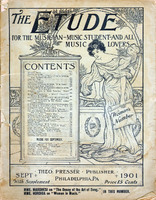The teacher who makes a specialty of the theoretical side of music is frequently astonished at the peculiar and erroneous views expressed by organ-pupils as to the necessity for the study of harmony and counterpoint. Many organists who play fairly well will, when approached upon this subject, confess frankly that they know little or nothing about it, and say they fail to see why they should devote time and labor to a branch of the profession which is of no practical use to them.
The popular idea seems to be that this subject belongs exclusively to the realm of composition, and that the musician who simply plays or sings has no need for a knowledge of it.
While it is true that many organists do acceptable choir-work without this knowledge, it is equally true that they could do much better work with it; that is, with a clear and thorough understanding of the rules of good part-writing. But, even among those organists who profess to have studied harmony and counterpoint, there are comparatively few who have grasped the subject in such a way as to be able to put it to practical use.
A prominent musician has said that: “Women do not, as a class, grasp counterpoint any more than they do higher mathematics.” If this be true, it is undoubtedly due, in some degree, to the fact that they have failed to realize its importance, and, in consequence, have not entered into the study of harmony with a determination to make it a living element of their musical work. In other words, many of them are content with a smattering of the rudimental principles which makes it possible for them to say: “O yes! I have studied harmony.”
One or two cases that have come under personal notice will suffice to show the tendency to superficial work in this beautiful and important study:
A young lady who was teaching piano and organ in a seminary applied for lessons in harmony. She had studied this branch for several months, but wished to take a position as church-organist and felt unequal to it “because she could not modulate from one key to another.” She stated frankly that this was her only reason for wishing to continue the study. When it came to a simple ear-test as to key-relationship, she proved to be unable to distinguish the degrees of the diatonic scale when struck at random on the piano. Another teacher went to New York for study in voice culture, and while there took five lessons in harmony from one of the best contrapuntists in the city in order that she might announce herself as his pupil.
It may be true that women do not grasp the higher forms of theoretical study, but it remains yet to be proved that they cannot do so. The chances are that, when they become thoroughly awakened to the importance of serious study in this direction, they will set to work and master it just as they have mastered law, medicine, and other subjects for which they were formerly considered totally unfit.
In this age of hurry and rush there are very few persons willing to spend time upon a study that seems to promise no practical benefit; consequently it devolves upon every conscientious teacher to impress upon his pupils the practical good of harmony and counterpoint. Let him prove to them that these branches are not a collection of dry, uninteresting rules, but the very life and spirit of all good music, whether chordal or contrapuntal. Let him show them that here is found the open door to the delights of transposition, modulation, improvisation, etc. Once convinced of these facts, they will set about the study with more serious purpose and with a determination to overcome its difficulties and make it of practical use in choir-work. Having gained a thorough understanding of the fundamental principles of harmony, the majority of students will become so enamored with its logical beauty that they will require no further urging to take up the higher branches of counterpoint, fugue, and canon.—Emma Louise Ashford.



